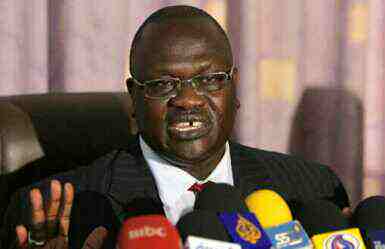S. Sudanese parliamentarian declares support for federalism amid mass defections
June 4, 2014 (NAIROBI) – A South Sudanese lawmaker from Western Equatoria state has publicly defied president Salva Kiir’s objections to a federal system of governance by announcing his full support for the proposed move.

The legislator’s remarks come two days after Kiir addressed the parliament in the capital, Juba, in which he criticised calls by former vice-president turned rebel leader Riek Machar for a federal system, saying it was a ploy to divide what he described as an “internal front”.
However, Zingifuaboro told Bakhita Radio’s Wake Up talk show in Juba on Wednesday that Equatorians support federalism.
He criticised the current system of government in South Sudan “in which power is centred in the central government”, saying a federal system would entail the devolution of powers from the national government to state authorities.
Zingifuaboro is the second senior government official to publicly throw his support behind the demand for a federal system.
The sitting state governor of Central Equatoria, Clement Wani Konga, was the first to announce his support to the federal system of governance.
Last week, a consultative conference was conducted in Juba by representatives from the three states of the Greater Equatoria region in what observers said was a visible consensus to endorse federalism.
In an apparent backflip on his earlier stance, the region’s top politician and current vice-president, James Wani Igga, has attempted to dissuade the region from endorsing federalism.
Sudan Tribune understands his views did not meet with popular support, with participants at the conference advising journalists not to publish his comments.
Prior to his appointment as vice-president in August, Igga last year endorsed federalism during a conference in the Greater Equatoria region in which a resolution was passed to this effect.
His recent U-turn is seen by many as a mere appeasement of his boss in order to maintain his position.
MASS DEFECTIONS TO REBELS
Meanwhile, at least 15 legislators in South Sudan’s national parliament have defected to the Machar-led rebel movement.
Richard K. Mulla, a renowned lawyer and member of parliament in Juba representing Mundri constituency of Western Equatoria state, has announced his defection to the rebel movement along with 15 other members, mainly from the Greater Upper Nile region.
Mulla, who was critical of the Kiir’s administration while in parliament, fled the country, making the announcement on Wednesday from the Kenyan capital, Nairobi, in which he also accused the president’s regime of dictatorship.
He said he had left South Sudan in fear of his life, saying the government would not tolerate his criticism.
Mulla said the central government did not accept meaningful internal dialogue and that the only way to change the status quo was to remove the regime by force.
“I had to join (the opposition) because now I’m seeing that there is too much dictatorship in Juba. It has to be removed and the only way to do so is by joining the opposition,” Mulla said.
“If my own life was in danger, how could I survive if I come and speak to parliament?” he added.
Among the 15 parliamentarians to defect were Gabriel Yoal Dok, of Jonglei state, Matthew Mathiang Deng, of Unity state, and Gatluak Riek Jaak, of Upper Nile state.
(ST)
